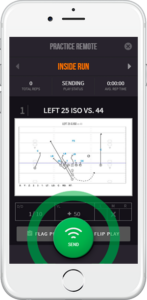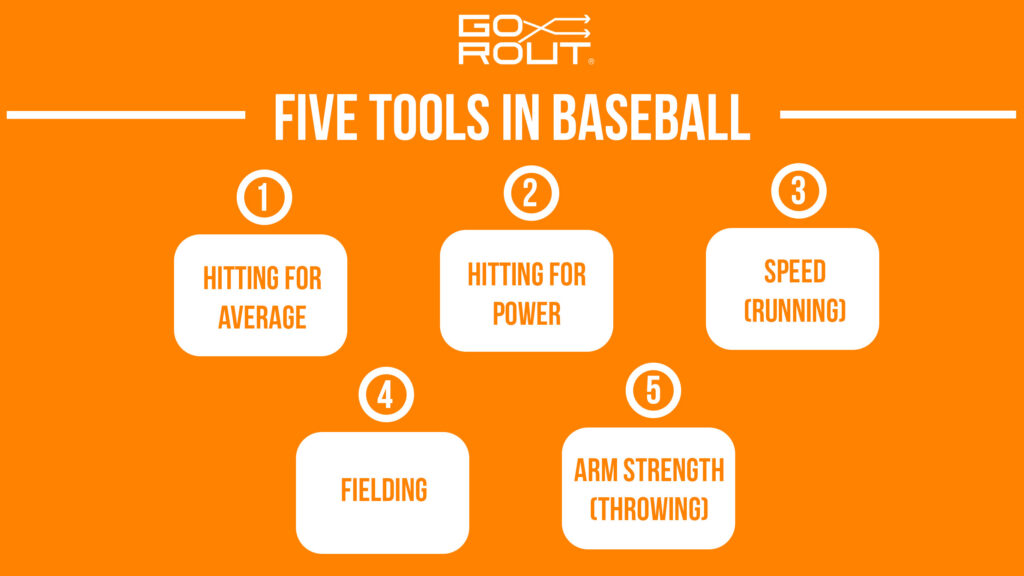Football Conditioning: Drills and the Benefits of a Modern Approach
Reading Time: 10 minutes
Reading Time: 10 minutes
Football requires aggressive and repetitive conditioning workouts for players to hone their skill development and perform their best on the field.
However, as football conditioning coaches begin incorporating technology and tailored training programs into their practices, traditional training methods are slowly disappearing.
This change in training methodologies is driven by the need to improve team performance through effective drills that simulate game-like scenarios, reinforce fundamental skills, and foster team cohesion and communication.
With the advancements of technology, coaches now have access to training systems that allow them to communicate with players like never before.
The GoRout football practice system is one such example. It has transformed the coaching experience and football practices by enabling teams to increase their reps using coaches’ apps and rugged player devices.
In this article, we will explore the significance of football conditioning, the changing nature of training methodologies, and the crucial role of effective football conditioning drills and technology in elevating team performance.
Traditional vs. Modern Approaches to Football Conditioning

Traditional football conditioning methods focus on building endurance and strength through standardized exercises. These practices are usually anaerobic and involve continuous body movements.
However, modern approaches to football conditioning focus on functional movements, sport-specific conditioning, technology integration, and individualized programming.
It enables the optimization of performance while minimizing the risk of injury.
Traditional approach
Coaches have implemented different training methods into football’s strength and conditioning programs to better prepare athletes for the sport’s demands.
Strength training and conditioning programs have traditionally focused on endurance, muscular strength, and team cohesion through structured workouts.
Strength training often involves resistance exercises to increase muscle mass and maximal strength, which are crucial for winning one-on-one matchups. Conditioning work typically includes anaerobic exercises that allow players to perform high-intensity efforts and recover quickly, mirroring the sporadic bursts of activity during a game.
Football conditioning programs also incorporate drills that simulate game situations to address the sport’s specific physical requirements, such as explosive power and agility. These drills help players improve their ability to execute quick directional changes and maintain speed over short distances, reflecting the dynamic nature of football.
While traditional methods have effectively built a base fitness level, personalizing programs to individual needs is also important. It helps to optimize performance and can reduce the risk of overuse injuries by accounting for each player’s physical condition and role on the field.
Efficiency in training is also a critical consideration, focusing on maximizing the relevance and effectiveness of each exercise. It ensures that training time is well spent on activities that directly transfer to on-field performance, enhancing skill development alongside physical conditioning.
Modern approach
The modern approach to football conditioning emphasizes agility, speed, and functional football strength. It prioritizes tailored training regimens that replicate movements and skills required during games.
Technology integration into training programs has become integral to the modern approach, skyrocketing success for modern-day football teams.
Conditioning coaches and staff use GPS tracking, wearable devices, communication systems, and video analysis tools to monitor performance, track workload, and optimize training.
Most coaches use these technologies to provide insights into player metrics, enabling them to tailor training plans and identify specific areas for improvement.
Modern conditioning programs maximize efficiency, minimize injury risk, and boost player performance, guiding teams to their next win.
Key Components of Football Conditioning

Football conditioning is crucial to a team’s success.
A coach’s training program should incorporate traditional and modern approaches to ensure that players are properly prepared for the game’s physical demands.
Let’s share the key components of football conditioning that every coach should consider when designing their training program.
Strength and power training
Strength training is done to increase muscle strength and mass. Athletes use this to push their opponents, hold their ground and perform explosive movements when blocking and tackling.
Power training, on the other hand, focuses on developing fast-twitch muscle fibers through explosive movements. It enhances an athlete’s speed, agility, and acceleration.
Specific exercises and drills
Athletes perform exercises to strengthen muscles and improve conditioning for football during practice drills. Specific exercises and power drills for football strength and conditioning include:
- Box squats
- Deadlifts
- Bench and overhead presses
- Lunges
- Rows
- Plyometric jumps
- Medicine ball throws
- Kettlebell swings
- Sled pushes
- Tire flips
Periodization techniques
Periodization is a training system that divides training into specific blocks of time to optimize performance and minimize injury risk.
Preparation phase
This phase emphasizes skill development, technical ability, endurance, and mobility. It establishes a solid training foundation and increases overall volume before the competitive football season begins.
Intensification phase
The off-season training phase aims to reduce volume and intensify conditioning workouts while refining skills and preserving the central nervous system before training camp to complement on-field practice.
Pre-competition phase
This phase is a training camp that simulates the structure of a competition. It involves in-season strength training routines that focus directly on the sport.
Competition phase
During the regular-season football schedule, athletes focus on optimizing game performance and prioritizing recovery. During this period of the season, players are in the weight room three days per week, mostly focusing on recovery, football in-game solutions, and game preparation.
Speed and agility training
Speed and agility drills train players to change direction rapidly, accelerate, and maintain top speed during gameplay.
Agility ladder drills
Agility ladder drills incorporate lateral shuffles, high knees and quick feet drills into practice. They improve footwork, agility and coordination.
Cone drills for improved footwork
Using cones in different patterns and distances can help football players improve their speed and footwork during games with minimal equipment.
Sprinting techniques
It’s important to develop explosiveness and acceleration through sprinting drills for a football team to make quick breaks, chase down opponents, and execute fast plays.
Endurance and cardiovascular conditioning
Endurance and cardiovascular conditioning enable players to perform well throughout a football game without fatigue.
Cardiovascular drills for football players
Cardiovascular exercises, such as interval runs, shuttle sprints, and jogging pace, are great for improving cardiovascular health and stamina. These exercises simulate the stop-and-go nature of sports.
Balancing intensity and recovery
Balancing high-intensity work with adequate rest and recovery prevents overtraining and injuries, requiring careful management by a conditioning coach.
Football Conditioning Drills: Examples and Best Practices

When implementing football conditioning drills, consider each player’s fitness levels and include proper warm-up and cooldown routines to reduce the risk of injury.
Warm-up drills
Warm-up drills begin football conditioning workouts, get the blood flowing and raise the heart rate. These are a few drills to get you started.
- Jumping jacks
- Karaoke
- High knees
Position-specific drills
Football players can improve their skills and abilities by practicing position-specific drills. These drills focus on different aspects of the game, such as passing accuracy, route running, blocking technique, tackling proficiency, and kicking skills.
It is important to customize drills based on a player’s position, whether offensive, defensive, or special teams. By doing so, players can have effective workouts and become well-trained athletes.
Offense
Quarterbacks
- Footwork drills: Focus on dropbacks, rollouts and pocket movement
- Passing drills: Work on accuracy, velocity and timing with receivers
- Read progressions: Practice reading defenses and making quick decisions under pressure
- Ball security drills: Emphasize proper grip and ball protection during throws and handoffs
Specific drills
- Two-cone lateral weave
- Lateral hat dance
- Three hurdle drill
Running backs and wide receivers
- Route running drills: Practice various route combinations, cuts and breaks
- Ball handling drills: Improve ball security, catching techniques and ball-carrying skills
- Blocking drills: Work on blocking techniques like pass protection and run blocking
- Agility drills: Enhance agility, footwork and change of direction to elude defenders
Specific drills
- Linear hat dance
- Four cone zig-zag
- 90-degree cut drill
Offensive linemen
- Blocking technique drills: Focus on stance, hand placement, leverage and drive blocking
- Pass protection drills: Practice pass sets, punch timing and mirroring techniques
- Combo blocks: Work on coordinated blocking assignments, double teams and combo blocks at the line of scrimmage
- Recognition drills: Train linemen to recognize defensive fronts, stunts and blitz packages pre-snap.
Specific drills
- Push-pull drill
- Mirror drill
- W drill
Defense
Defensive backs
- Backpedal and break drills: Focus on backpedaling technique, hip transitions and breaking on the ball
- Press coverage drills: Practice jamming receivers at the line of scrimmage and maintaining tight coverage
- Ball skills drills: Improve interception and pass breakup techniques through ball drills and tracking exercises
- Tackling drills: Work on open-field tackling, tackling angles and wrapping up ball carriers
Specific drills
- Square footwork drill
- Backpedal and break
- T-speed turns
Linebackers
- Key read drills: Train linebackers to read offensive keys, recognize run/pass plays and react
- Block shedding drills: Practice shedding blocks from offensive linemen and fullbacks
- Coverage drills: Work on zone drops, man coverage techniques and covering routes in pass defense
- Pursuit drills: Emphasize pursuit angles, closing speed and gang-tackling techniques
Specific drills
- Flip and double-flip
- Z drop drill
- Spot drill
Defensive linemen
- Pass rush drills: Practice rushes to pressure the quarterback
- Run defense drills: Work on maintaining gap integrity, shedding blocks and making tackles
- Hand fighting drills: Improve hand placement, usage and disengagement from offensive linemen
- Block recognition drills: Train linemen to recognize run/pass keys and react quickly
Specific drills
- Circle lean drill
- Close down drill
- Course work drill
Special teams
Kickers
- Field goal drills: Practice proper kicking technique, consistency and accuracy from various distances and angles
- Kickoff drills: Work on kickoff placement, hang time and distance for effective coverage
- Onside kick drills: Practice executing onside kicks and recovering loose balls
- Pressure situations: Simulate game-like scenarios with time constraints and scoreboard pressure
Specific drills
- No step drill
- Balance drill
- Directional kickoffs
Punters
- Punting technique drills: Focus on drop, approach and follow-through
- Directional punting drills: Work on punting to specific areas of the field to pin opponents deep
- Pooch punting drills: Practice shorter, higher punts to limit return opportunities
- Punt coverage drills: Incorporate coverage techniques and assignments to prevent long returns
Specific drills
- Leg swing drill
- Ball drops
- Crossfield kicks
Team-based conditioning drills
Team-based conditioning drills foster camaraderie, teamwork and competition while improving physical fitness. Some common team drills used after practice or during warmups are:
- Relay races
- Partner drills
- Team circuit training
Benefits of a Modern Football Conditioning Approach

1. Injury prevention
Football conditioning now emphasizes targeted exercises, improving flexibility, strengthening muscles, and reducing the risk of injuries. Coaches extensively use injury prevention strategies to help players maintain physical health and compete throughout the season.
2. Improved performance
Modern conditioning programs improve football performance by employing football-specific exercises, speed and agility training, strength and power development, and recovery protocols.
Players improve their speed, agility, strength, and endurance each training week, leading to better tackling, blocking, running, and decision-making during games.
These training programs are an effective way to enhance player performance on the field.
3. Adaptability to evolving game strategies
Present-day football conditioning emphasizes adaptability through tactical drills, evolving game simulations, and position-specific training. Players use these skills to adjust, stay ahead of the competition and develop their abilities according to different game strategies.
Introducing the GoRout Football Practice System

GoRout aims to simplify communication on the field by offering coaches a system to communicate with their players, comprising a web and mobile app and rugged wearable devices.
It grants instant access to critical information, which helps improve practice sessions and prepare the team for game day. GoRout saves time, increases repetitions, and enhances performance.
Thousands of coaches trust GoRout for their modern team needs. GoRout has transformed practice routines by optimizing scout team drills and streamlining installations, taking weekly preparations to new heights.
Get a quote now.
Web scripting app

At GoRout, we revolutionize practice scripting and organization by seamlessly integrating with popular play drawing tools. Our simple scripting app is compatible with any card drawing software and has quick functions for adding, editing, copying, and reordering scripts or cards. Coaches can swiftly move plays between periods, saving time and enhancing their preparation for practices and games.
On-field practice app

The On-Field Football Practice application leverages GoRout STEEL™ to streamline practice sessions. This innovative tool can begin and end football practice, organize practice scripts and transmit plays through a custom On-Field Remote.
GoRout facilitates swift and seamless communication with each player, offering on-field formation flipping, one-tap play flagging for instant review and the option to live-edit cards directly on the field.
Player wearable devices

GoRout player devices are designed for durability during long and demanding practices. They do not require setup or WiFi connectivity, ensuring hassle-free use straight out of the box.
You can select practice groups to distribute plays to players. Our player devices vibrate and give players access to play drawings and position-specific messaging to stay focused and prepared throughout football practice sessions.
Benefits of GoRout Football Practice System

Developed by experienced coaches
- The brainchild of experienced coaches familiar with effective sports communication
- Offers tailored solutions based on firsthand coaching experience
Effortless integration with leading technologies
- Seamlessly compatible with top platforms as well as hand-drawn cards
- Enhances versatility and usability for coaches and players
Enhanced practice efficiency
- Increase a team’s average reps by 2.5
- Frees up valuable time for additional coaching guidance
- Offers players more opportunities for improvement
Reliable performance in all conditions
- Engineered to thrive in diverse weather conditions regardless of extreme temperatures, humidity or precipitation
- Guarantees reliability during crucial moments on the field
Comprehensive coverage warranty
- Backed by a comprehensive 100% full-coverage warranty
- Gives users confidence in the reliability, security service, and durability of the GoRout system
Coaches Testimonials of GoRout Football Practice System
Take a look at these GoRout testimonials from coaches like you who can attest to the efficiency of the GoRout football practice system.
Eastern Illinois University
“Our football team made a massive improvement from 2 wins in 2022 to 8 wins in 2023, and GoRout was a huge part of our team’s improved performance. It allowed us to be as efficient as possible with our players’ time. We were able to run more plays weekly in practice and cut down on the time we had to be on the field. The team at GoRout was amazing to work with. The quality of their product and customer service are second to none. Our players and coaches love the GoRout product.”
– Chris Wilkerson
Mount Lebanon High School
“We tell our players only to do things that will help them win. There is no doubt that GoRout is one of those products. The efficiency of our practice went through the roof and our scout team produced a much higher quality replication of the opponent. And most importantly, it has a seamless point and click to make less work for my coaching staff and allow them to work smarter, not harder.”
– Bob Palko
Iowa Western Community College
“GoRouts were a game changer in our preparation week in and week out at Iowa Western. It increased our efficiency running scout teams and the amount of plays we were able to run each day was unbelievable.”
– Scott Strohmeier
Experience GoRout football practice for yourself!
Conclusion
Conditioning football players has become more efficient with innovative technology and customized conditioning programs. Conditioning coaches are adopting new tools such as the GoRout practice system to elevate team performance through their training regimen.
Explore the benefits of GoRout and request a quote to see how our communication system can enhance your practices and increase your chances of winning your next football game!







